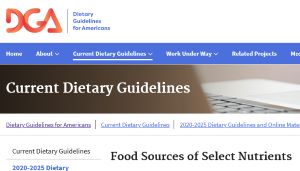New Handouts from USDA Highlight Food Sources, Including Vegan Sources, of Calcium, Potassium, Fiber, Vitamin D, and Iron
By Reed Mangels, PhD, RD
The Dietary Guidelines for Americans, 2020-2025 identified four nutrients – calcium, potassium, fiber, and vitamin D – that are commonly under-consumed in the United States. Iron was also identified as a concern for infants age 6 months and older who are receiving mostly human milk and for pregnant people.
Some of these nutrients, namely fiber and potassium, are usually found in generous amounts in vegan diets that include a variety of whole plant foods. Vegans, like many others in the United States, may have diets that are low in calcium and vitamin D. Several expert groups have concluded that vegetarians, including vegans, have higher iron requirements than nonvegetarians because of the lower bioavailability of iron from plant foods (1-3).
The USDA developed lists of foods and beverages that feature some of the highest sources of calcium, vitamin D, iron, fiber, and potassium. The lists are available in two forms, one with standard portion sizes and one with smaller portion sizes which may be appropriate for young children or some older adults who have lower calorie needs. Foods included on the lists with standard portion sizes provide at least 130 milligrams of calcium; 80 IU of vitamin D; 1.8 milligrams of iron; 280 milligrams of potassium; and 2.8 grams of dietary fiber.
These lists can be used to find foods that will help meet needs for these nutrients. While these lists include animal products, they also include vegan sources of these nutrients. For example, the calcium list includes many vegetables, tofu, tahini, and fortified plant milks. If you are trying to increase the amount of calcium, vitamin D, iron, fiber, or potassium in your diet, you can use these lists to identify vegan foods that meet your needs.
References
- Institute of Medicine, Food and Nutrition Board. Dietary Reference Intakes for Vitamin A, Vitamin K, Arsenic, Boron, Chromium, Copper, Iodine, Iron, Manganese, Molybdenum, Nickel, Silicon, Vanadium, and Zinc. Washington, DC: National Academy Press; 2001.
- Joint FAO/WHO Expert Consultation on Human Vitamin and Mineral Requirements. Vitamin and Mineral Requirements in Human Nutrition, 2nd ed. Geneva, Switzerland: World Health Organization and Food and Agriculture Organization of the United Nations; 2004.
- National Health and Medical Research Council. Nutrient Reference Values for Australia and New Zealand. Iron. https://www.nrv.gov.au/nutrients/iron. 2014.
To read more about the Dietary Guidelines for Americans see:
What Have the U.S. Dietary Guidelines Said About Vegan and Vegetarian Diets?
VRG Testimony on 2025-2030 Dietary Guidelines for Americans
2020-2025 Dietary Guidelines for Americans Released; Has Both Positive and Negative Features
To read more about calcium, vitamin D, and iron for vegans see:

